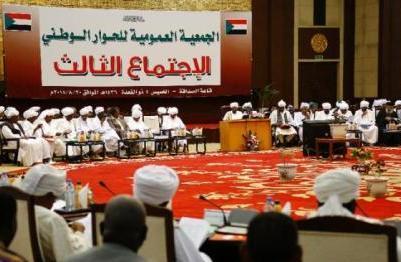Sudan’s dialogue body downplays memo of the national figures
May 6, 2016 (KHARTOUM) – Sudan’s dialogue mechanism known as 7+7 has dismissed the memorandum submitted by national figures to President Omer al-Bashir as “elitist” and said the president is committed to implement the outcome of the dialogue conference.

However, member of the 7+7 committee and secretary general of the Popular Congress Party (PCP) Kamal Omer has criticized the memo, describing the signatories as “limited elite”.
He pointed that President Bashir has pledged to implement the outcome of the national conference.
“It [ the memo] is vague and it deals with minor issues such as the executive power while the national dialogue which is the largest political project since independence has discussed all governance issues,” he said.
Omer told the semi-official Sudan Media Center (SMC) that the memo calls for forming a government of technocrats with unclear tasks while the national dialogue recommended a government of national consensus, saying the time for the technocratic governments is over.
“We can’t get a head of the national dialogue and allow a group of people to submit a memo which includes issues that have been discussed at length in the dialogue conference”, he added
He renewed their commitment to the national dialogue saying they wouldn’t allow any party to circumvent its outcome.
“We had enough of the memos and views of the elitist groups” said Omer
HOLDOUT GROUPS AND DIALOGUE
For its part, the ruling National Congress Party (NCP) disclosed that the 7+7 mechanism has reached understandings with some of the holdout groups to join the national dialogue.
NCP deputy chairman and presidential aide Ibrahim Mahmoud Hamid said the general secretariat of the dialogue conference has prepared the draft document of the recommendations.
He told the SMC that arrangements for holding the general conference would start soon, saying the participants would discuss the recommendations and the proposed national document.
Hamid added that the dialogue process is still ongoing in order to bring in the largest number of the holdout opposition to agree on the national constants, saying the 7+7 mechanism managed to convince new forces to join the dialogue.
The internal dialogue conference was inaugurated in Khartoum on October 10 th, 2015 amid large boycott from the major political and armed opposition.
Political forces members of the opposition alliance National Consensus Forces (NCF) and other parties refuse to take part in the dialogue conference before the creation of a conducive environment and the implementation of specific confidence-building measures provided in a roadmap proposed by the African Union mediation team.
Some significant political parties, such as the National Umma Party, the Reform Now Movement and the Just Peace Forum, that approved the process in the beginning.
But later they suspended their participation, criticizing the government refusal to postpone the general elections and the lack of political freedoms.
Also, the major armed movements in Darfur, South Kordofan and Blue Nile refrained from participating in the dialogue conference citing similar demands.
(ST)
